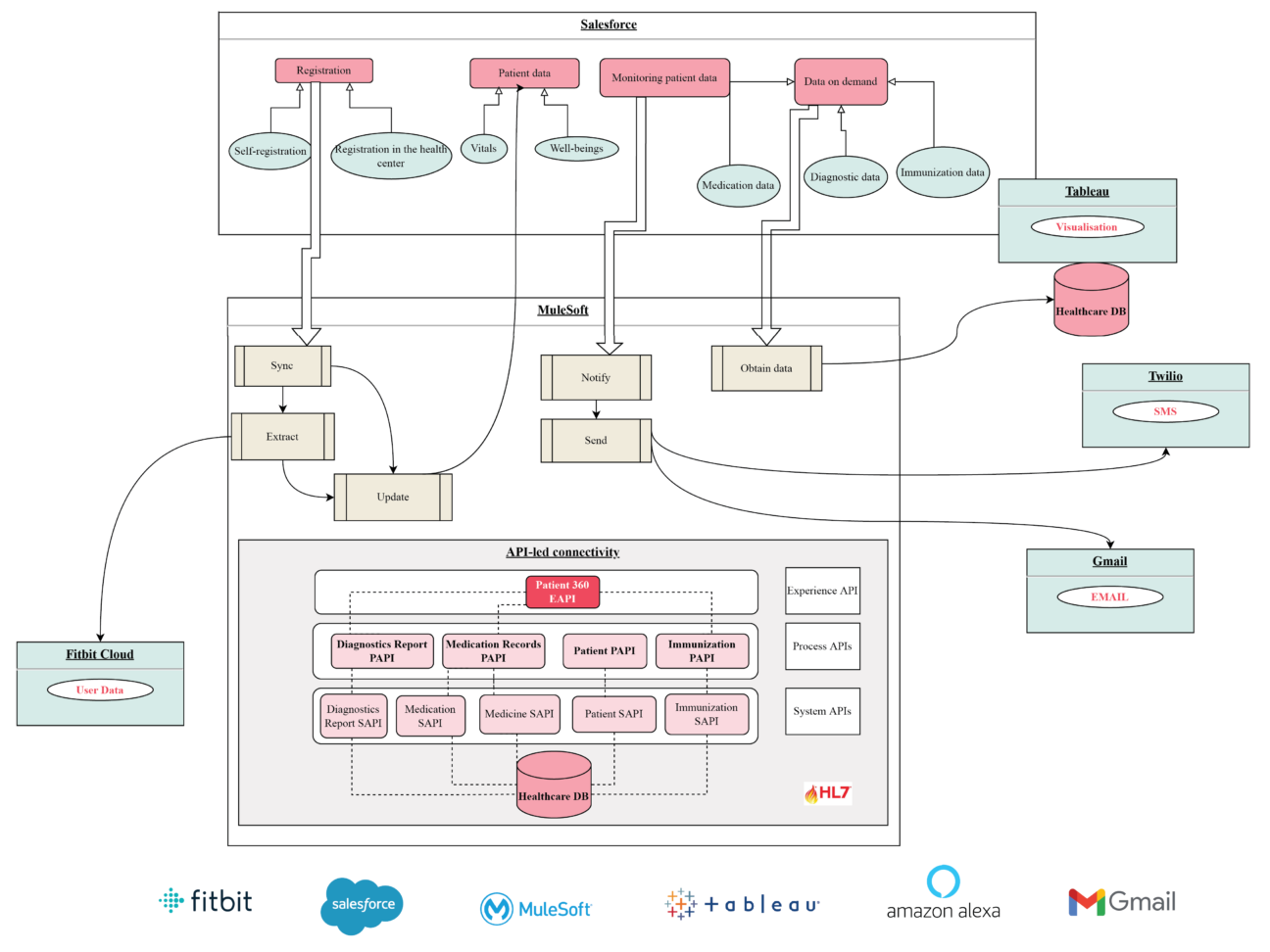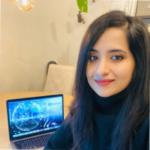The new era of the patient experience isn’t just “coming”; it’s already here. Have you thought about the solution that would adapt to this new era and meet patients’ ever-changing needs and expectations?
We did and came up with a solution that can benefit many healthcare consumers; hence, if you want to learn more about it, keep on reading. Accordingly, we will present you:
Challenges that motivated us to implement this solution
Implementation of the solution, as well as the components and technologies used
Benefits our solution brings to healthcare services, doctors, and patients
Challenges as a motivator
Building this solution was motivated by the reflection on the need to solve some of the healthcare industry’s challenges. Accordingly, some of the leading healthcare challenges are listed:
- Backlog of patients due to Pandemic
- Lack of single source of patient record, privacy and security concerns
- Health information exchange barriers between GP/Hospitals/Private Clinics
- Lack of Smart devices and Apps adoption
- Lack of interactive reporting and visualisation of vaccination, general health, diagnostic, and clinical data ducts ready for client assignments
In addition, the currently active vaccination program entails the need for efficient data management. Still, a lack of innovative technology like wearables means that healthcare professionals can’t function as efficiently as they possibly could. Furthermore, being able to contact patients remotely and without the need for an appointment would increase communication between patient and doctor, meaning more data collected for each patient and more care provided.

Healthcare Smart device accelerator brings quite a few benefits for patients with disability, post-operative care, rehabilitation and severe health issues (Cardiac, diabetes, etc.) to monitor their general health with ease. They can get benefited using smart technology to get auto notifications regarding changes in their vitals, book appointments to be more proactive check-ups etc. With Smart device technology it will revolutionise the way healthcare services are being currently delivered to patients during this unprecedented pandemic situation.
Our product will help medical centers monitor patients’ health daily via wearable smart devices and thus make the whole healthcare experience much easier for both doctors and patients. The solution is especially beneficial for old, physically challenged, and people with special needs.
Using our solution, doctors can track essential vitals such as heart rate and blood pressure, and if they notice a problem, they can quickly notify the patient and schedule the appointment. This will turn into an increased collaboration among them. On top of this, usage of the solution will result in cutting down on face-to-face meetings and, this way, reducing the likelihood of either patient or staff contracting Covid19, which is essential to keep the hospitals and GPs running at peak efficiency.
The solution powered by Devoteam
Our Smart Device solution includes multiple components implemented using different technologies, allowing for rapid extension and modification to the solution. The components and technologies used within the solution are following:
- Salesforce is used as the Healthcare CRM so Health Centres and hospitals will use it to interact with doctors and patients.
- Fitbit Smart Device (at the moment, but can be Garmin, Apple, Samsung, etc.) holds individual users’ data such as Heart Rate, Sleep-related data and other health metrics.
- Alexa is used as SMS and Email service for passing the notifications between doctors and patients.
- Mulesoft is behind all, and it represents the underlying Integration Layer by tying all components together. It also initiates the synchronization of data and ensures Notifications get routed to the correct Service Provider.
- Tableau is used for Data Visualisation, which is crucial in the process of raw data transformation to a more readable and understandable format.

To bring you closer to the created solution, we will take you through the typical user journey, as well as the underlying processes.
The first step in the typical user journey is the registration process. Users can choose between self-registration and registration in the health center by the employee. In both cases, patients are asked to provide their data. In addition, they need to attach an identity document to confirm identity within self-registration. After the data is checked and their profile has been made, they receive an email to provide access to different scopes of their devices. This generates auth code, which Mulesoft later uses to get the access/refresh tokens and store them for invoking the Fitbit APIs later.
After the successful registration process, the user will receive another email confirming that he has been successfully registered. This means that Mulesoft can now retrieve a patient’s smart device data, and to do that regularly, it uses a scheduler that runs in specified periods. The monitored data are vitals and well-being. Vitals can refer to blood pressure or the pulse, and well-being are activities the patient performed, such as swimming, running, resting, etc. Mulesoft then transforms received patient’s vitals and well-being data and loads them into Salesforce. When the abnormal change in a patient’s health data occurs, either the doctor or the patient is notified, depending on how serious the problem is. A message, which can be sent via email, SMS, or both, notifies the patient to schedule a health checkup appointment at the health center. This message is sent via Notification API, which is integrated with Alexa, and this provides the capability to send bulk SMS and well-formatted emails. Also, the NHS is used to push notifications.

This Healthcare solution intends to accelerate the health industry and patients’ needs. It provides a single place for preventative care and a complete overview of the patients’ health status. Accordingly, we strive to reduce pressure on health services and improve patients’ experiences through easy system usage for all interested end-users. We are witnessing the revolution in the health industry; therefore, ease of use and efficiency in data access is something that technology needs to ensure.
On top of this, doctors can also have a full 360° view of their patients, consisting of patients’ diagnostic, immunization, and medication data, which they receive on-demand. Also, when doctors choose which data they want to get, they can filter them, and get the most relevant information. Mulesoft receives this data from different sources. Besides using the database as a data source, integration with Cerner Health System has also been used. The received information is later transformed and, on request, sent to the Salesforce, which then presents it to the doctor.
We want to point out that best practices are followed on both the Salesforce and Mulesoft sides during the development. For instance, Salesforce Sandbox is located on Salesforce Health Cloud, and during the development of the APIs, the Mulesoft API-led approach has been followed. Most importantly, API specification has been built by following HL7 FHIR standards.
The benefits
One of the essential things to keep in mind with each solution development is its benefits to the end-users, as well as their user experience. Our Smart Device solution has three main user groups: healthcare services, doctors, and last but not least, patients. The solution is highly beneficial for each group, and some of the benefits are listed below:
Healthcare service:
- Reduced congestion and unnecessary contacts
- Easier appointment schedule
- Less workload and better working conditions for employees
- Increased availability of the service itself
Doctors:
- Easy access to patients’ data
- Facilitates communication and cooperation with the patients
- Easily tracking of important vitals and wellbeing
- Complete patients health history in one place
Patients:
- Faster and of higher quality health service
- Easier appointment schedule
- Doctor availability
- Rapid identification of health problems

Healthcare solutions are now an essential part of health care industries and this solution has made the patient registration process hassle-free, doctors can easily retrieve patient’s history and take necessary actions.
Conclusion
We are witnessing that more and more consumers are now looking for and expecting greater value and quality of service, timely and convenient care, and transparent information, so we came up with the solution to improve patient experience and reduce pressure on healthcare services. Organizations should consider accepting these changes and meet their patient’s expectations; otherwise, they risk losing them to the competition.
Finally, it is essential to emphasize that we successfully integrated with Cerner Health System with minimal changes and proved our solution is easily adaptable and can be combined with any health system. Also, the solution is designed in a way to support the usage of any smart device type.
